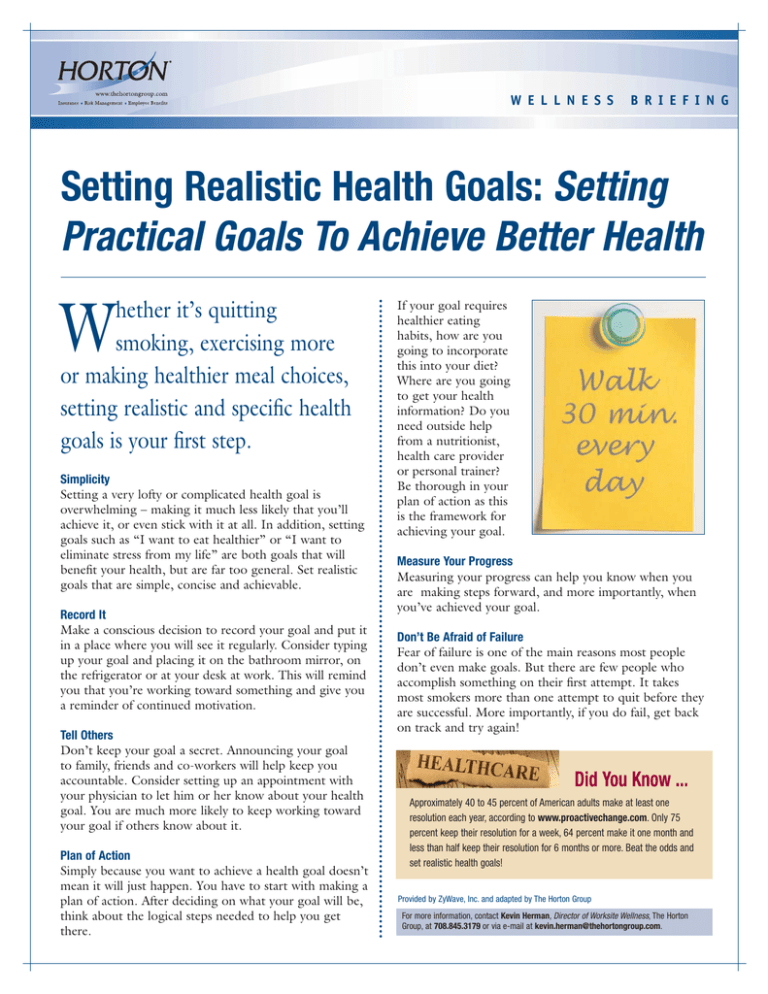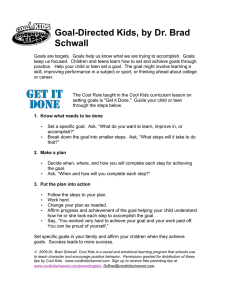Setting Practical Goals To Achieve Better Health
Anuncio

W E L L N E S S B R I E F I N G Setting Realistic Health Goals: Setting Practical Goals To Achieve Better Health hether it’s quitting smoking, exercising more or making healthier meal choices, setting realistic and specific health goals is your first step. W Simplicity Setting a very lofty or complicated health goal is overwhelming – making it much less likely that you’ll achieve it, or even stick with it at all. In addition, setting goals such as “I want to eat healthier” or “I want to eliminate stress from my life” are both goals that will benefit your health, but are far too general. Set realistic goals that are simple, concise and achievable. Record It Make a conscious decision to record your goal and put it in a place where you will see it regularly. Consider typing up your goal and placing it on the bathroom mirror, on the refrigerator or at your desk at work. This will remind you that you’re working toward something and give you a reminder of continued motivation. Tell Others Don’t keep your goal a secret. Announcing your goal to family, friends and co-workers will help keep you accountable. Consider setting up an appointment with your physician to let him or her know about your health goal. You are much more likely to keep working toward your goal if others know about it. Plan of Action Simply because you want to achieve a health goal doesn’t mean it will just happen. You have to start with making a plan of action. After deciding on what your goal will be, think about the logical steps needed to help you get there. If your goal requires healthier eating habits, how are you going to incorporate this into your diet? Where are you going to get your health information? Do you need outside help from a nutritionist, health care provider or personal trainer? Be thorough in your plan of action as this is the framework for achieving your goal. Measure Your Progress Measuring your progress can help you know when you are making steps forward, and more importantly, when you’ve achieved your goal. Don’t Be Afraid of Failure Fear of failure is one of the main reasons most people don’t even make goals. But there are few people who accomplish something on their first attempt. It takes most smokers more than one attempt to quit before they are successful. More importantly, if you do fail, get back on track and try again! Did You Know ... Approximately 40 to 45 percent of American adults make at least one resolution each year, according to www.proactivechange.com. Only 75 percent keep their resolution for a week, 64 percent make it one month and less than half keep their resolution for 6 months or more. Beat the odds and set realistic health goals! Provided by ZyWave, Inc. and adapted by The Horton Group For more information, contact Kevin Herman, Director of Worksite Wellness, The Horton Group, at 708.845.3179 or via e-mail at [email protected]. W E L L N E S S B R I E F I N G Cómo establecer objetivos de salud realistas: Establezca objetivos prácticos para lograr una mejor salud a sea que se trate de dejar de fumar, hacer más ejercicio o tomar decisiones más saludables con respecto a los alimentos, establecer objetivos de salud realistas y específicos es la primera medida que tiene que tomar. Y Simplicidad Establecer un objetivo de salud muy alto o complicado es abrumador, y esto hace que sea menos probable de alcanzarlo o, incluso, de seguirlo. Además, establecer objetivos como “quiero llevar una dieta más saludable” o “quiero eliminar el estrés de mi vida” son objetivos que beneficiarán su salud pero son demasiado generales. Establezca objetivos realistas que sean simples, breves y factibles. Registrarlo Tome una decisión consciente de registrar su objetivo y colóquelo en un lugar donde lo vea con frecuencia. Considere la opción de escribir su objetivo y colocarlo en el espejo del baño, en el refrigerador o en su escritorio del trabajo. Esto le recordará que está trabajando hacia un objetivo y será, a su vez, un recordatorio de motivación continua. Hable con los demás No mantenga en secreto su objetivo. Anunciar su objetivo a la familia, los amigos y los compañeros de trabajo lo ayudará a seguir con la responsabilidad. Programe una cita con su médico para informarle sobre su objetivo relacionado con la salud. Es mucho más probable que siga trabajando para lograr su objetivo si los demás lo saben. Plan de acción Simplemente porque desee alcanzar un objetivo de salud no significa que esto sucederá. Debe comenzar por crear un plan de acción. Después de decidir cuál será su objetivo, piense en los pasos lógicos que necesita tomar para alcanzarlo. Si su objetivo requiere hábitos alimenticios más saludables, ¿cómo va a incorporar esto en la dieta? ¿Dónde obtendrá información sobre la salud? ¿Necesita ayuda externa de un nutricionista, proveedor de atención médica o entrenador personal? Sea cuidadoso con su plan de acción ya que será el marco para alcanzar su objetivo. Evalúe su progreso Evaluar su progreso puede ayudarlo a saber si está avanzando y, lo que es más importante, cuándo alcanzó su objetivo. No tema al fracaso El temor al fracaso es uno de los principales motivos por los que la mayoría de las personas ni siquiera establecen objetivos. Pero hay pocas personas que logran algo en su primer intento. La mayoría de los fumadores deben intentar más de una vez dejar de fumar para lograr el éxito. Lo que es más importante, si fracasa, encamínese e inténtelo nuevamente. Did You Know ... Aproximadamente entre el 40 y el 45 por ciento de los adultos estadounidenses toman al menos una resolución cada año, según el sitio www.proactivechange.com. Solo el 75 por ciento mantiene esta resolución durante una semana, el 64 por ciento lo hace durante un mes, y menos de la mitad mantiene su resolución durante 6 meses o más. Supere los pronósticos y establezca objetivos de salud realistas. Provided by ZyWave, Inc. and adapted by The Horton Group For more information, contact Kevin Herman, Director of Worksite Wellness, The Horton Group, at 708.845.3179 or via e-mail at [email protected].


